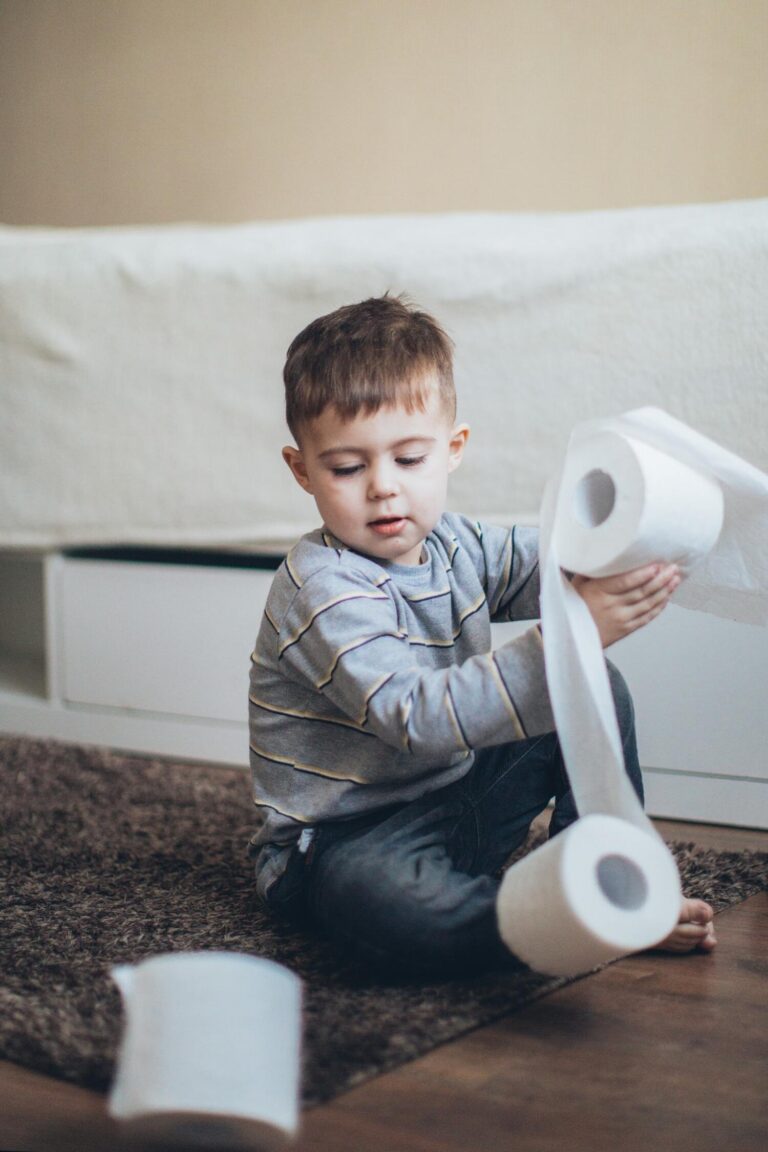The Best Age-Appropriate Chores for Kids of All Ages!

Have you been trying to figure out how to get your kids to do chores, but it is just an ongoing battle? You are not alone. Many parents struggle with getting their kids to contribute to the family and do chores to help around the house, but don’t worry. We have tips and suggestions to make this constant fight turn into a less stressful and engaging conversation with your kids.
What Age Can Kids Start Doing Chores?
Believe it or not, preschool age is a good time to start doing things around the house. It will help your child build healthy habits and responsibility from a young age, which will be helpful as they get older and their personalities get more complicated. Teaching responsibility early is crucial for your child’s development because it will help them as they grow to become responsible, helpful members of your family. You’ll soon be such a proud mom once you see your kids thrive with their chores, which will also lend you a helping hand.
Does It Make It Easier To Implement Chores With A Routine?
Yes. Developing a routine will help you and your family stay on a great schedule with cleaning and organization. It will also help everyone remember what they must do because their responsibilities will be the same depending on the day and time.
You can develop family schedules to help everyone get started and stay on task. Your little ones may need pictures rather than words initially, but everyone should have a list of things they need to do that day, so there is no reason not to get everything they need done.
How Do You Decide What Chores Are Age Appropriate for Your Child?
You can decide based on what you think your child can do. We have compiled a list of age-appropriate chores below to help. You can plan to change things and add more as they age and you feel they can do more. Some families change expectations yearly based on the school calendar, and others change things based on birthdays, but you can decide what works best for your family.
How Do You Decide How Many Chores Your Child Should Have?
You can decide how many chores your kids can do based on how long it will take them to complete and how much help they need to complete them when they are new.
- For younger kids (ages 3-9), consider starting with one or two daily chores that take about 10-20 minutes.
- For older kids (ages 10-12), consider starting with three to five daily chores that take about 25-35 minutes.
- The list can be more extensive for teens and take 40 minutes or more. This will also help prepare them for when they start working around this age.
How Should You Plan To Implement This With Your Child?
It is best to plan a week ahead. Everyone in the family will have tasks that will be the same every week, making weekly prep more manageable. However, things change weekly, so set a day each week when you reset schedules and have things set in advance for the coming week.
If your child uses a visual schedule or checklist, this is the perfect time to set it up for the following week so things can continue running smoothly. Over time, the kids will learn their routines and won’t need to use the visuals as often, but it is still essential to keeping everyone organized.
How Can You Make This an Easier Experience for Everyone?
It is no secret that your kids may not be happy about doing chores. As a parent, going through a tiring day and then coming home and fighting with your kids about doing their tasks can be frustrating. Although we can’t guarantee no complaining, there are ways to make it so everyone gets something out of the situation. Remember, give yourself grace. Being a mom isn’t easy.
Creating a reward system for chore completion is one of the best ways to motivate your kids to do their chores without a fight.
- Giving your child an allowance is a great way to motivate them. You can pay them per chore or week, depending on the deal you work out with them. You can then make a chore chart or use a chore app to track their progress. This option works best for older children and teens because the money may be more motivating to them than other things you offer.
- You can also have them earn tokens to save up enough for one large item they are interested in, such as a bike or video game system. You can also do this with younger children and let them earn tokens to save up for a special event or dessert.
- Little ones may need more immediate rewards, such as small toys and snacks they can earn for each chore.
- Using a visual chore completion chart with stickers or check marks can also help you and your child track how close they reach their goal of a toy, meal, event, etc. This is a great visual motivator for the kids and can be modified for all ages.
Our Suggested Chore List for Kids of All Ages
We have organized our list by age as a suggestion to help you plan out what chores you will decide to have your kids do. We recommend keeping the chores they are already doing and building on them rather than having them move on to something else. This will keep it cumulative, and your kids can see what it’s like to gain responsibility as they age.
For Children Ages 3-5:
They can put their toys away:
- This will encourage them to clean up their toys after playtime, giving them ownership of their things and teaching them responsibility and respect for their belongings.
They can help match the socks when you do laundry:
- It’s fun and helps develop matching skills for your little ones.
They can help wipe mildly dirty surfaces:
- Give them a damp cloth to wipe down tables or countertops.
They can do simple dusting:
- Give them a feather duster to do a light dusting around the house.
They can feed the pets:
- With help, they can feed the pets. This will also give them a feeling of ownership for their pets because they will be helping take care of them.
For Children Ages 6-8:
They can set the table:
- Teach them to set the table for meals. You can use a placemat with a visual of where everything is supposed to go so they can start doing this more independently from the beginning.
They can clear the table:
- You can show them where the dirty dishes are after dinner and how to pack up any leftovers to put away.
They can water the plants:
- You can show them what the plants need, and they can water outdoor and indoor plants.
They can make their own bed:
- You can make the bed the first time to model what it should look like and how to make it. Afterward, you can help guide them through the process or make a step chart with reminders when they start independently.
They can fold the laundry:
- You can fold the first time to model what it should look like and how to fold each type of clothing. Afterward, you can help guide them through the process or make a step chart with reminders when they start independently.
For Children Ages 9-11:
They can help sort the laundry before it is washed:
- Set up hampers to sort whites and colors into so they’re ready when you want to clean them.
They can empty small trash cans and take out the garbage:
- Depending on where your family lives, you can show them how to tie up the bag and take it to the garbage pail, dumpster, or trash shoot.
They can go food shopping with you:
- Show them how to help keep the grocery list up-to-date, and they can come to the store to help you get everything you need.
They can help with meal prep:
- You can show them what you need to do, and they can help with things like peeling celery or packing lunches. Eventually, they can take over meal prep, which will lighten your load!
They can help organize small spaces:
- Show them what cabinet or shelf to organize and suggest ways to do it efficiently. Then let them see how they do!
For Early Teens Ages 12-14:
You can monitor them mowing the lawn:
- For older kids, mowing the lawn can be a helpful chore and a great physical activity for your growing teens.
They can change the sheets:
- You can show them how to change the sheets and pillowcases the first time and monitor them until they can do it independently.
They can wipe down the windows:
- You can use child-friendly cleaning solutions for windows and show them how to wipe the windows. After they watch you, they can try it on their own.
They can fill and empty the dishwasher:
- Show them where everything goes when they unpack the dishwasher and how it should be packed while everything is still dirty.
They can take care of their personal belongings:
- Work with them to organize their space the first time, and make it clear that keeping it clean and organized is one of their chores.
For Teens Ages 15-17:
They can take over meal prep:
- Teach them how to make the things you want prepped for the week. Then, assist them with cooking and packing until they get the hang of it and take over independently. Learning to cook and meal prep is an essential life skill many don’t even know how to do as adults. Make sure your kids learn to cook and enjoy it, hopefully!
They can sweep inside and out:
- Teach them to sweep and let them take over indoor and outdoor areas that need it.
They can organize the closets:
- Show them what closet to organize and suggest ways to do it efficiently. Then let them see how they do!
Vacuuming and mopping the floors:
- Older teens can handle vacuuming and mopping the floors. You can tell them what room to do and model the first time if necessary.
They can go grocery shopping:
- Once they can drive, they can handle a grocery list and shop for the week.
They can help with deep cleaning:
- They can take over more thorough cleaning tasks as part of spring cleaning or deep-cleaning sessions.
We hope this list of tips and ideas for how to get organized and get your kids involved in doing chores around the house! You can establish a routine and organize your family to keep chores engaging and valuable.
This article originally appeared on Wealth of Geeks.






